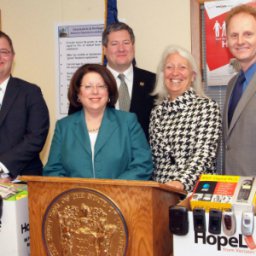New Laws Part of Rationalization in Health Care Resources Recommendations
TRENTON – A package of bills sponsored by members of the Senate Health, Human Services and Senior Citizens Committee which address hospital governance in an attempt to keep hospitals competitive in New Jersey was signed into law today by Governor Jon Corzine.
The first bill in the package, S-1794, requires each general hospital in New Jersey to annually conduct a public meeting for the community it serves. The meetings will focus on the delivery of care to the community, and give local residents a chance to form a dialogue with hospitals’ executives to discuss how better to serve the community.
“Our local hospitals serve as safe havens for the residents who live nearby, and they play a vital role in the communities they serve,” said Senator Redd, D-Camden and Gloucester, who is a prime sponsor of S-1794. “Hospitals can only continue to provide this necessary care if they are in tune with the needs of residents, so it is imperative that the lines of communication are open between hospital administration and the public.”
The second bill in the package, S-1795, requires that all trustees in a general hospitals receive training in the delivery of health care services. The training, established last year by the Commissioner of Health and Senior Services in consultation with the New Jersey Hospital Association, the Hospital Alliance of New Jersey, and the New Jersey Council of Teaching Hospitals, is designed to prepare hospital trustees for the financial, organizational, legal, regulatory or ethical issues they may face in governing a hospital. Under the previous law, only trustees approved after April 30, 2007 were required to undergo such training.
“Hospital trustee members should be properly trained to fulfill their duties,” said Senator Ronald L. Rice, D-Essex. “Trustees must ensure that hospitals are operating efficiently and are financially responsible. Sufficient education and training are vital to ensuring that hospitals are staffed with the most qualified individuals in order to prevent mismanagement of resources.”
“This law was based on recommendations from the Commission on Rationalizing Health Care Resources, which was established to examine regulatory, financing and market mechanisms that affect the long-term stability of the State’s health care delivery system,” said Senator Jim Whelan. “It is vital that all hospital board members are aware of every aspect of their facilities, and in order to do so, they must complete this training program which will help clarify the roles and duties of a hospital trustee.”
The third bill in the package, S-1796, authorizes the Department of Health and Senior Services to conduct enhanced monitoring of hospital financial performance, and intervene in the management of hospitals for facilities identified as being in fiscal distress. According to Senator Bob Gordon, the bill sponsor, the concept behind the new law is to allow the State to be more proactive in identifying hospitals at risk, and seeking to pull them out of the downward spiral into financial collapse.
“New Jersey has faced an epidemic of hospital closures in recent years,” said Senator Gordon, D-Bergen. “Through this legislation, the Department of Health will have an early warning when a hospital becomes fiscally unstable, and will be able to take the appropriate action to ensure that the health care needs of the community are met. Hopefully, we will be able to intervene before fiscal instability gives way to fiscal insolvency, and yet another health care facility in the Garden State has to close its doors forever.”
The final bill in the package, S-1797, caps hospital bills for uninsured patients at no more than 15% above the Federal Medicare charge. The bill also calls upon the Department of Health and Human Services to develop a sliding fee scale, based on family income, which will be used to determine reasonable costs for hospital services.
“In a time when many people are struggling to make ends meet, I fully understand that the financial hardship has also been passed on to our local hospitals,” said Senator Weinberg, D-Bergen. “This law will ensure, however, that hospitals will not make up for their funding issues by overcharging uninsured patients. With the way the economy is today, often families are one large medical bill away from living in the ‘poor house.’ It is imperative that affordable health care is within reach for all New Jerseyans.”


